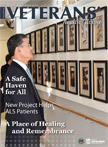VA New England Healthcare System
Palliative Care Research at White River Junction VAMC
We’re With You Every Step of the Way!
When a patient receives the diagnosis of a chronic and/or serious condition, the impact can be overwhelming and even devastating. Palliative care serves as a means to help cope with these emotionally distressing challenges.

“Palliative care is part of good care. A whole team of doctors, nurses, nutritionists, social workers, and chaplains are all involved, and they provide an extra layer of support.”
While hospice care is palliative care, palliative care is not hospice care. Palliative care is specialized medical care that helps patients and their families live as fully as possible when facing a life-threatening illness. Hospice focuses on patient care in a person’s remaining days; usually six months or less. Palliative care focuses on the patient’s needs as well as the needs of their caregiver. It aims to address the patient as a whole person, attending to his or her physical comfort, confidence, emotional well-being, spirituality, and dignity while dealing with a
According to Dr. Lisa Lambert,Primary Investigator on Palliative Care Research at White River Junction Veterans Affairs Medical Center (VAMC), “Palliative care is part of good care. A whole team of doctors, nurses, nutritionists, social workers, and chaplains are all involved, and they provide an extra layer of support.” She added, “In recent years there has been a movement toward palliative care; as people get more serious illnesses, the focus is more on the quality of life, not necessarily curative only.”
White River Junction VAMC is under the umbrella of the Dartmouth Medical School (now called Geisel School of Medicine), and has been a part of multiple research efforts on the effects and benefits of palliative care in conjunction with Dartmouth-Hitchcock Medical Center.
The current study is researching the most beneficial time to introduce palliative care. Dr. Lambert related that multiple research studies have demonstrated that palliative care improves health care quality in three areas: it relieves physical and emotional suffering; improves and strengthens the patientphysician communication and decision-making process; and it assures coordinated continuity of care across multiple healthcare settings – hospital, home, hospice, and long-term care.
“What’s exciting,” Dr. Lambert says, “is that our research proves we have the ability and the tools through palliative care to care for the whole person and to improve the quality of life for both the patient and their caregiver.”
For more information on palliative care at VISN 1, contact your local VAMC.
ALS Redesign System of Care | Memorial Wall | Safe Haven | Palliative Care

















